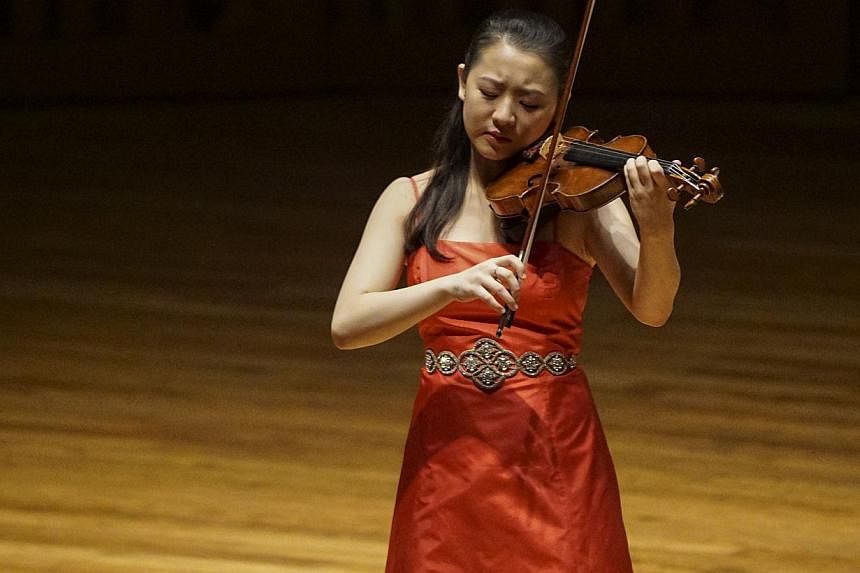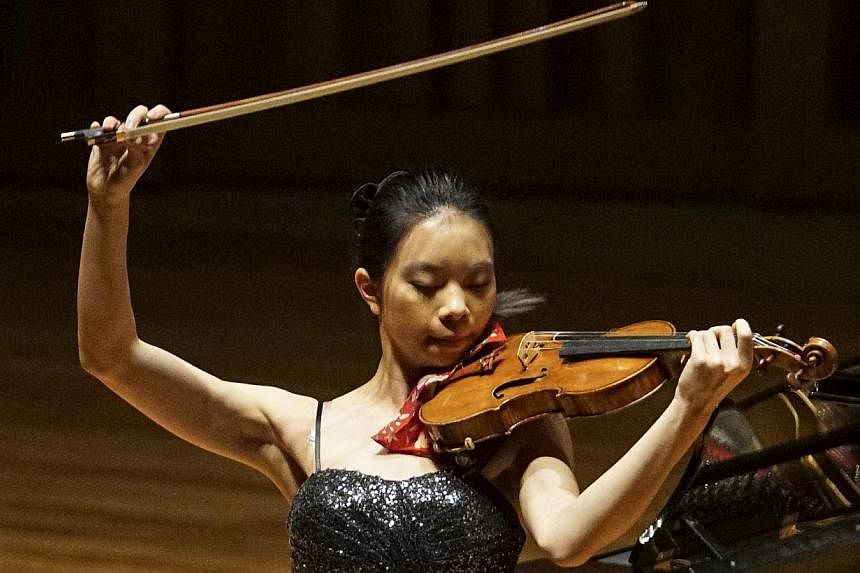It is Singapore's biggest classical music contest, with a top prize of US$50,000 (S$66,000), a recording contract with Naxos and performances with major orchestras ready to boost the career of one talented violinist from anywhere in the world, under the age of 30.
And the country has made a strong showing so far on stage: Three of the 12 semi-finalists announced this week at the inaugural Singapore International Violin Competition have strong ties to Singapore.
They include Singaporean violinist Loh Jun Hong, who did his bachelor's at the Yong Siew Toh Conservatory of Music, as well as Ukrainian musician Oleksandr Korniev, a second-year student on full scholarship at the same conservatory.
Then there is Anna Lee from South Korea, who turns 20 this year and studies at the Kronberg Academy. She lived in Singapore as a child and began her violin training at age four under the Singapore Symphony Orchestra's Alexander Souptel, who is now retired.
"For me, this was a very important opportunity to come back home," said a laughing Lee after her set in the first round of the competition, taking photos backstage with her honorary "grandfather" Souptel. "I'm going to eat durian now. Absolutely."
Lee and other semi-finalists were chosen on Monday evening after a three-day first round featuring 35 musicians from 14 countries. The semi- finalists will go on to play recitals of violin-piano sonatas at the Yong Siew Toh Conservatory Concert Hall from today to Friday.
The top six scorers go to the finals, where they play with the Yong Siew Toh Conservatory Orchestra at Victoria Concert Hall. Next Wednesday, the top three will face off in a grand final at the Esplanade Concert Hall, accompanied by the Singapore Symphony Orchestra.
"It looks like it's going to be one of the biggest competitions," says contestant Francisco Fullana of Spain, who did not make it past the first round despite his impressive record as a competitor and soloist. He won the 21st Johannes Brahms Competition in Austria last year, took the national prize at the 2006 Pablo de Sarasate Violin Competition and has played with orchestras such as the Bavarian Radio Symphony while doing his bachelor's and master's at The Juilliard School in New York.
He was the first to play in the live round but also the last to arrive, thanks to a delayed flight from New York. That meant he had to rehearse his set in a nursing lounge in the Taipei airport instead of the conservatory concert hall but he waves such matters away.
"It is what it is," he says. "The results are very subjective, it depends on so many factors. It's hard to prepare so many pieces as well."
On the bright side, offstage he gets to meet old friends such as his "little sister" Lee - they both studied under violinist Masao Kawasaki in the United States.
US contestant Sirena Huang, who made it to the semi-finals, notes the strength of the competition here. "It's been very eye-opening for me to meet all these musicians," says the 21-year-old, who won the 6th International Tchaikovsky Competition and the 2011 Cooper International Competition, among others.
"Beauty, honesty, personality and sincerity are what we're looking for," contestants were told last Friday as they picked the lots that would dictate their time on stage. The speaker was the head of jury and Yong Siew Toh Conservatory's head of strings Qian Zhou, who also leads the artistic committee in charge of the competition. She has roped in famous musicians for the jury, from Israel's Shmuel Ashkenasi to South Korea's Kim Nam Yun. They have reputations for artistic excellence and also for nurturing it in their students. In addition, each member of the jury has also judged well-known competitions such as the celebrated Queen Elisabeth Competition in Belgium, which this year offers a top prize of €25,000 (S$40,000) to a young violinist.
Apart from the richness of the prize, musicians appreciate that the Singapore International Violin Competition is no flash in the pan for the country's 50th birthday celebration. Funding from sponsors such as businessman and violin collector Rin Kei Mei has allowed five such contests to be planned for, one to be held every three years.
"If you do a one-shot competition, it has no meaning for the world of music," says Mr Didier Schnorhk, who is secretary-general of the 76-year-old Geneva International Music Competition and a key member of the artistic committee organising the Singapore competition. "You have to do a few competitions and then you can say this is a good one."
He says the Singapore contest fills a void - there are few well-reputed violin competitions in Asia apart from those in South Korea and Japan. "In the world of music, the main competitors are coming from Asia so it's important that you have strong competitions in Asia, not just in Europe."
The competition received about 150 applications from 27 countries between June and September last year. An anonymous panel of judges, audited by Mr Schnorhk, listened blind - without seeing the videos - to about 178 hours of music before selecting the 35 candidates for the first round.
In the case of Yong Siew Toh Conservatory student Xiaoxuan Shi, 22, from China, just being selected to compete with rising stars felt like a win. "For me, the important thing is not to pass the first round but to know myself on stage better," she says. "If I pass, it means I'm good enough to pass the first round, if not, that means I have to practise more."
Equally pragmatic is Singaporean Ian Ike See, a violinist with the Australian Chamber Orchestra, who made it to the first round but not to the semi-finals.
"There are always things that you know you could have done better or that you've done better in the rehearsal but there's no point looking back and being disappointed," says See, who turns 26 this year.
"You just keep trying and keep learning. The important thing for us musicians is not to sit still."
The semi-finalists (in alphabetical order):
1. Alexandra Conunova, Moldova
2. Sirena Huang, US
3. Petteri Iivonen, Finland
4. Chisa Kitagawa, Japan
5. Oleksandr Korniev, Ukraine
6. Ryota Kuratomi, Japan
7. Anna Lee, South Korea
8. Lim Hyun Jae, South Korea
9. Richard Lin, Taiwan
10. Loh Jun Hong, Singapore
11. Fedor Rudin, France
12. Tseng Yu-chien, Taiwan




